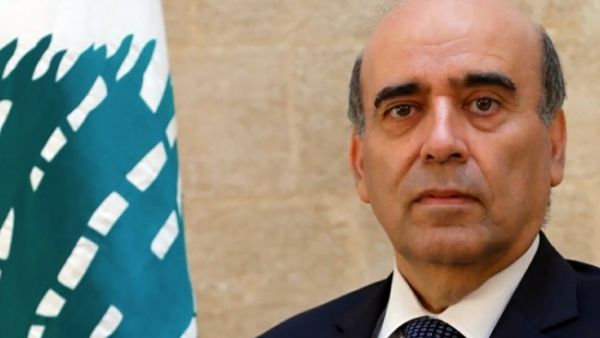Charbel Wehbi was appointed as Lebanon’s new foreign minister Monday, hours after Nassif Hitti’s surprise resignation from the position.
President Michel Aoun issued an official decree appointing Wehbi to the position, following a meeting with Prime Minister Hassan Diab.
Wehbi is Aoun's diplomatic adviser and former ambassador to France. Wehbi’s diplomatic career has spanned 42 years with the Foreign Ministry. Upon retiring from the ministry, he was appointed by Aoun as a diplomatic adviser in 2017.
Wehbi, 67, served as Lebanon’s ambassador to Venezuela from 2007 to 2012, and consul general of Lebanon in Los Angeles from 2002 to 2007.
United Nations Special Coordinator for Lebanon Jan Kubis said the resignation delivered “quite a message.”
“Will this cry of deep frustration move #Lebanon to finally work on reforms, on measures taking care of the Lebanese, sinking every day deeper into poverty and desperation?” Kubis tweeted.
The appointment came after Hitti resigned from his position in protest of the government's poor handling of the country's crisis and a lack of willingness to implement essential reforms.
Prime Minister Hassan Diab accepted Hitti's resignation after meeting him at the Grand Serail, and later held talks with President Michel Aoun over a replacement.
“I had high hopes for change and reform, but the reality aborted the fetus of hope,” Hitti said in his resignation statement.
The foreign minister said he would not compromise his convictions, principles and conscience for a position of power.
“Lebanon today is not the Lebanon we loved, that we wanted to be a beacon and model, it is slipping to become a failed state God forbid,” he said.
Hitti said his resignation was due to his inability to “perform my duties during this historic and crucial time, and due to the absence of a vision for Lebanon that I believe in, a free, independent, effective and radiant nation in its Arab environment and the world.”
The absence of an effective will to achieve comprehensive and structural reform, which is a key demand by the international community for Lebanon was also a reason for Hitti’s resignation, according to the statement.
“I resigned from my duty as foreign minister, hoping that the government and those who manage the state re-evaluate many of the policies and practices, and give priority to citizens and the nation over all other considerations and differences,” Hitti said.
"I participated in this government on the basis that I have one employer, Lebanon," he added.
"There are conflicting employers and interests in this country, and if they are not united to serve and rescue the Lebanese people, then the boat, God forbid, will sink with everyone on board,” Hitti concluded.
Hitti was appointed as foreign minister as part of Diab’s government in January. The government, backed by Hezbollah and its allies, was appointed after a popular uprising against the political class which demanded political and economic reforms as well as an end to corruption. The Lebanese economy since teetered on the verge of collapse and the pound lost around 80 percent of its value on the black market.
According to political sources, in addition to the government’s performance, a number of other reasons led to this decision, including Diab’s criticism of the French foreign minister who visited Lebanon recently, and Hitti feeling undermined as foreign minister after a top security official was sent to the Gulf to appeal for aid.
Lebanon is facing its worst economic and financial crisis, with the population experiencing electricity blackouts, poverty, mounting piles of garbage on the streets and a severely devalued national currency, which has drastically decreased their purchasing power.
This article has been adapted from its original source.







